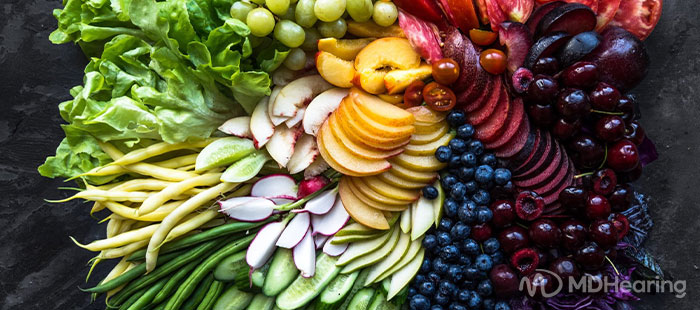Can Vitamins and a Healthy Diet Lower Your Risk of Hearing Loss?
When it comes to hearing loss, we often point fingers at loud music or noisy work environments. But what if the foods you eat could play a role in protecting your hearing? The truth is, there are a wide variety of lifestyle factors that contribute to hearing loss and hearing loss prevention—and the quality of your diet is one of them.
Research shows that certain nutrients can improve ear health and reduce the risk of hearing loss. While results may vary, studies indicate that incorporating these nutrients into your diet can help prevent hearing loss in many cases.
Here are some key dietary supplements and foods to consider for better hearing health:
Fish Oil & Omega-3 Fatty Acid
Fish oil is famous for supporting heart health, but it turns out that it can benefit your hearing too. According to the American Journal of Clinical Nutrition, eating two helpings of fish per week can reduce age-related hearing in adults (aged 50 and up).
If you’re not a fan of fish, you can achieve the same benefits by taking your doctor-recommended fish oil pills. Look for them on the supplement shelf at your local grocery store or pharmacy.
Magnesium
Magnesium is essential for many bodily functions, but it’s also a critical nutrient for protecting against hearing loss. Yet, research from Oregon State University reports that 61% of U.S. adults consume less magnesium than the EAR (Estimated Average Requirement), which isn’t surprising considering how many Americans don’t like to eat their nuts and veggies. Nevertheless, scientific studies show that higher levels of magnesium consumption protect us against noise-induced hearing loss.
To boost your magnesium intake, focus on green leafy vegetables (such as spinach), whole grains, beans, nuts, and seeds. For an easy fix, try effervescent magnesium tablets, which can be found at most pharmacies. If you're heading to a concert or working in a noisy environment, these magnesium-rich foods might offer some extra protection for your ears.
Folic Acid
While folic acid (also known as Vitamin B9 or folate) is commonly associated with prenatal health, it also plays a significant role in hearing health. A 2007 study shows that folic acid supplementation can delay the onset of age-related hearing loss for the lower frequency sound ranges.
Fortunately, most daily multivitamins contain the 400 mcg daily recommended dose of folic acid, so if you’re taking a one-a-day, check the label to see if you’re getting all of the folic acid you need. You can also consume folic acid naturally through foods like beans, peas, lentils, leafy greens, legumes, asparagus, broccoli, Brussels sprouts, eggs, avocado, and citrus fruits.
Speak with your doctor before taking folic acid supplements because it may not be health-appropriate for people with certain conditions–especially patients with cancer, kidney problems, heart stents, or pernicious anemia (vitamin B12 deficiency).
Vitamin C, E, B12, and Beta Carotene
We have seen claims that vitamins C, E, B12, and beta carotene help to reduce hearing loss (beta carotene is a precursor to vitamin A). While experts disagree on whether there is a true correlation between these nutrients and hearing loss prevention, this scientific study claims that consuming higher amounts of these vitamins could reduce the risk of hearing decline, particularly in older adult males.
While scientists might have different opinions, we can all agree that vitamins C, E, B12, and beta carotene are great for your health. You may want to consider consuming more citrus for vitamin C; carrots and sweet potatoes for beta carotene; nuts and seeds for vitamin E; and fish, meat, poultry, eggs, and yogurt for vitamin B12.
If you’re considering supplements, a B-complex pill that contains folic acid (B9) could be a great choice. According to the American Journal of Clinical Nutrition, B12 taken with B9 was shown to reduce instances of age-related hearing loss in women between the ages of 60 and 71. B12 and folic acid deficiencies are some of the most common nutrient deficiencies among seniors, so again, vitamin B complex supplementation is an excellent idea no matter what.
Vitamin A
Vitamin A, essential for eye health, also plays a role in protecting your hearing. The Journal of Nutrition, Health, and Aging published a study showing that higher levels of vitamin A supplementation coincided with reduced instances of moderate or severe hearing loss.
Of course, there are many reasons to take vitamin A–such as the tremendous benefits it brings to your eyes, bones, and cells. To increase your vitamin A intake, enjoy foods such as sweet potatoes, spinach, carrots, tomatoes, apricots, cabbage, and watermelon. If you prefer a supplement, you can easily find vitamin A options at your local pharmacy or grocery store.
Resveratrol
Perhaps you heard about the antioxidant-rich benefits of resveratrol, a nutrient found in grapes, purple fruits, and purple vegetables.
Studies show that consuming resveratrol helps prevent blood clots, preserve blood vessel health, and lower bad cholesterol. A study published by Sage Journals suggests that sufficient levels of resveratrol could protect your hearing from the body’s inflammatory response to loud noise. The study showed that the presence of resveratrol reduces Cyclooxygenase (COX-2) production after loud noise exposure. As an inflammatory protein that the body produces in response to elevated noise exposure, scientists believe that COX-2 is one of the primary causes of noise-induced hearing loss.
Final Thoughts on Diet and Hearing Loss Prevention
While there’s still much to discover, science continues to uncover how dietary changes can influence hearing health. By adopting a health regimen that increases your consumption of the nutrients listed above and incorporating them into your daily diet, you could reduce the risk of hearing loss or protect your hearing from further damage. Always consult with your healthcare provider before starting any new supplements.
A healthy diet isn’t just good for your ears—it’s good for your entire body. If you’re already dealing with hearing loss, effective solutions like high-quality hearing aids can help you hear more clearly right away. At MDHearing, we provide affordable, FDA-registered hearing aids that can improve your quality of life.
MDHearing: High-Quality, FDA-Registered Hearing Aids That Won’t Break the Bank
At MDHearing, we offer medical-grade, FDA-registered OTC hearing aids directly to you. Unlike traditional hearing aid manufacturers that sell their products through hearing clinics, we cut out the middlemen and exorbitant retail markups, and pass those savings on to you. We also have a team of licensed audiologists and hearing professionals that can provide you with the same level of care that you’d receive at a clinic, but from the comfort of home. If you're looking for affordable hearing solutions that work, MDHearing might be just what you need.
Explore our line of affordable, high-quality hearing aids.
BROWSE MDHearing

